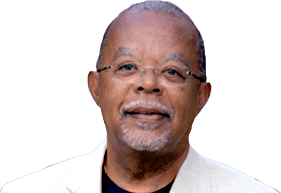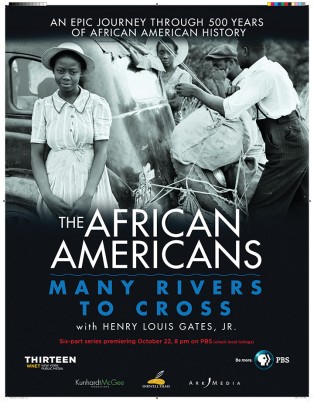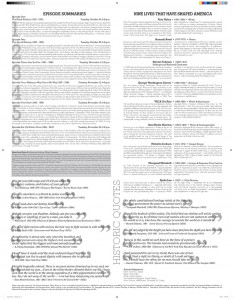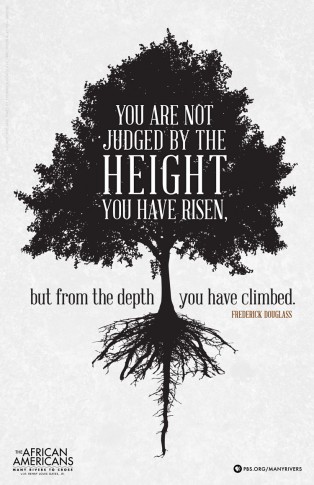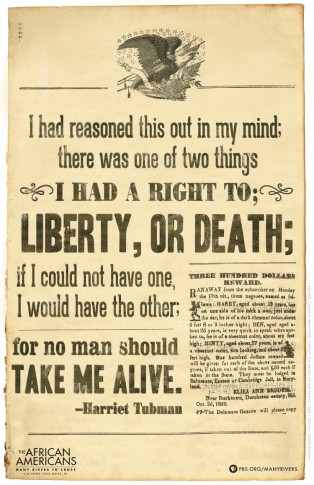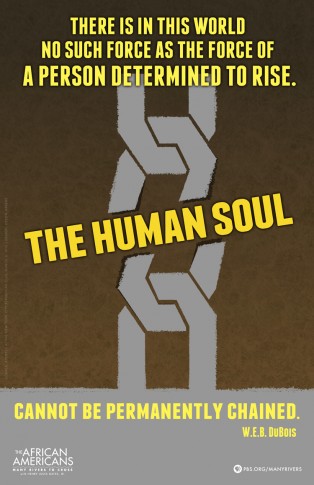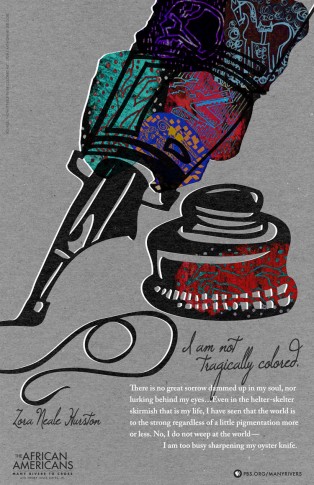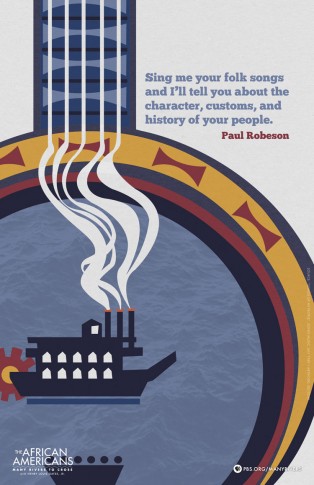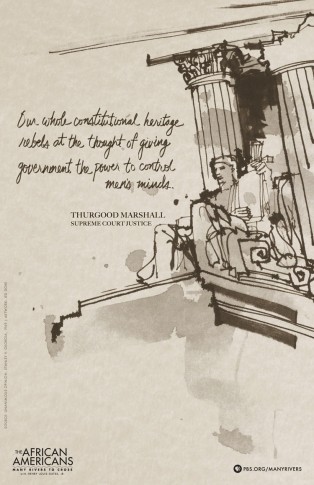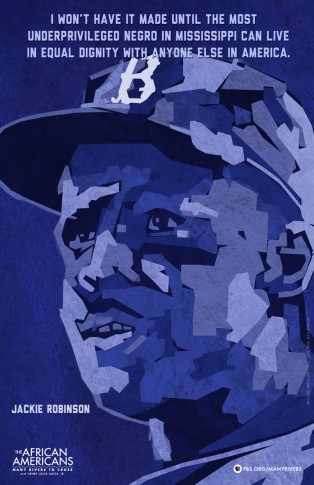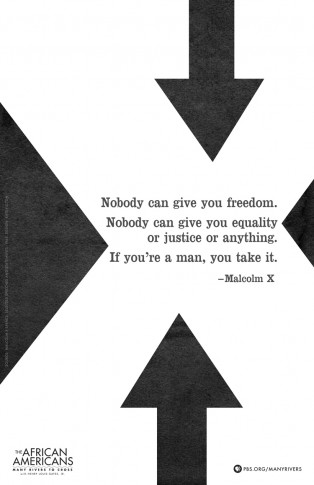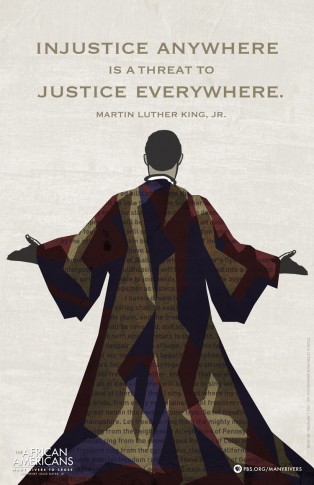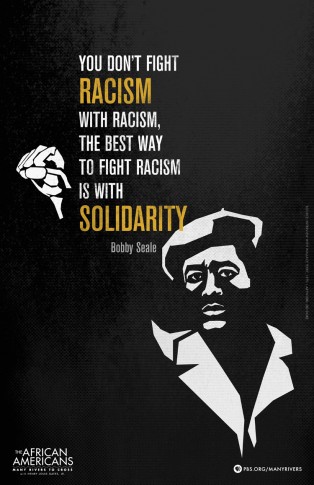This collection of original posters created for The African Americans: Many Rivers to Cross PBS series features quotations by famous African Americans, including leaders, intellectuals and cultural figures such as Harriet Tubman, W.E.B. DuBois, Zora Neale Hurston, Jackie Robinson, Malcolm X, President Barack Obama, and more. All the posters can be downloaded, printed and shared.
The African Americans: Many Rivers to Cross Series Poster
WNET’s Education Department distributed 30,000 posters to high school social studies teachers nationwide. The posters can be used to launch discussions around the Many Rivers to Cross series and contain episode descriptions, broadcast dates, notable quotes from famous African-Americans, and short biographies of Nine Lives That Have Shaped America.
The poster image features African American migrant workers from Florida on their way to harvest potatoes in Cranbury, New Jersey. The photograph was taken near Shawboro, North Carolina, by Jack Delan in July 1940. It was part of his work for the Farm Security Administration.
Frederick Douglass
Born a slave in Maryland, Frederick Douglass was first taught to read by his master’s wife when he was a boy, but he had to continue learning on his own, as teaching a slave to read was illegal. Douglass escaped to the North in 1838 and became an outspoken abolitionist. His autobiography, Narrative of the Life of Frederick Douglass, was published in 1845, making him an international celebrity. He became a leader of the abolitionist movement and in 1847, began publishing the North Star, the abolitionist weekly paper. He participated in the first women’s rights convention at Seneca Falls in 1848. During the Civil War he recruited northern blacks for the Union Army and served as an advisor to President Abraham Lincoln. In 1877 he was appointed United States Marshal for the District of Columbia, Recorder of Deeds for Washington, D.C., and in 1899 became Minister-General to the Republic of Haiti.
Harriet Tubman
Born a slave in Maryland’s Dorchester County around 1820, Harriet Tubman escaped to the North in 1849 out of fear that she was to be sold to another plantation. Shortly after her escape, she became one of the Underground Railroad’s most famous conductors. For the next decade, she returned to the South approximately 13 times and helped an estimated 70 slaves, including multiple family members, reach freedom. Abolitionist William Lloyd Garrison called her “Moses” after the Biblical prophet who led the Jews out of bondage from Egypt and Frederick Douglass said that “Excepting John Brown—of sacred memory—I know of no one who has willingly encountered more perils and hardships to serve our enslaved people than [Harriet Tubman].” Though a cash reward was offered for Tubman’s capture, she was never caught. She served as a nurse, scout and spy for the Union during the Civil War. After the war, Tubman moved to Auburn, New York, where she lived until her death in 1913.
W.E.B. DuBois
William Edward Burghardt (W.E.B.) DuBois studied at Fisk University, and then Harvard University, where he became the first African American to earn a doctorate. He published his seminal work, The Souls of Black Folk, in 1903, a collection of essays that touch on a wide range of topics including equal rights, stereotypes, and critiques of black leadership at the time. Along with William Monroe Trotter, DuBois led The Niagara Movement, an early black civil rights organization DuBois helped found in 1905. He was highly critical of the Atlanta Compromise, an 1895 agreement between African-American leaders and Southern white leaders that stated Southern blacks would not challenge current white political rule in exchange for basic access to education and due process in law. In 1909, DuBois co-founded the still active National Association for the Advancement of Colored People (NAACP), an organization dedicated to ensuring “the political, educational, social, and economic equality of rights of all persons and to eliminate racial hatred and racial discrimination.”
Zora Neale Hurston
Zora Neale Hurston was an American folklorist, anthropologist, and author. Her writing is often associated with the Harlem Renaissance—a black cultural movement that took off in the 1920s. She spent her childhood in Alabama and Florida before studying first at Howard University, and then Barnard College, where she was the school’s only black student. Shortly before starting at Barnard, Hurston’s short story “Spunk” was included in The New Negro—an anthology of fiction, poetry, and essays curated by Alain Locke. She traveled extensively, conducting anthropological research in the Caribbean and the American South. In 1937, Hurston wrote her seminal work, Their Eyes Were Watching God, which tells the story of Janie Crawford, a woman living in Florida in the early 20th century. The novel was received well by mainstream but was criticized by Harlem Renaissance notables like author Richard Wright, attacking it for failing to be a piece of “serious fiction.” The novel was rediscovered when universities started establishing Black Studies programs in the 1970s and 80s. Her literary legacy includes four novels and more than 50 short stories, plays, and essays.
Paul Robeson
The internationally celebrated singer and actor Paul Robeson, an outspoken activist, first distinguished himself as an athlete and academic at Rutgers University, where he was class valedictorian. After graduating from Columbia Law School he practiced law, but racism led him to leave the field. He found success singing and acting, which he had pursued during his student days, and traveled the world. Famous roles include Jim in Eugene O’Neill’s “All God’s Chillun Got Wings”, Brutus in “The Emperor Jones”, the title role in Shakespeare’s “Othello”, and Jim in the musical “Show Boat.” In the Jerome Kern and Oscar Hammerstein musical, Robeson performance of “Ol’ Man River” turned him into one of the most popular concert singers of the day. At the height of McCarthyism, the U.S. government investigated Robeson, who openly supported Soviet Russia and expressed anti-colonialist sentiments. The U.S. State Department refused to issue him a passport in 1950, and both his career and income suffered considerably. After his passport was restored in the late 1950s, Robeson toured abroad before health issues led to his retirement in 1963 in Philadelphia—where he remained until his death in 1976.
Thurgood Marshall
The 96th Justice of the Supreme Court of the United States was its first African-American one, Thurgood Marshall. The great-grandson of a slave born in modern-day Democratic Republic of the Congo, Marshall was born in Baltimore to his parents, William, a railroad porter, and Norma, a teacher. He studied at Lincoln University and then at Howard University School of Law. After graduation, he set up a private practice and started working with the National Association for the Advancement of Colored People (NAACP). Four years later, Marshall was appointed Chief Counsel for the NAACP at the age of 32. He successfully argued numerous cases before the Supreme Court, including Brown v. the Board of Education in 1954. President John F. Kennedy appointed him to the United States Court of Appeals for the Second Circuit in 1961. President Johnson appointed him Solicitor General in 1965, and two years later, nominated him to the United States Supreme Court, where he served as Associate Justice from 1967 to 1991.
Jackie Robinson
Jack Roosevelt Robinson was born into a family of sharecroppers in Georgia in 1919. Robinson excelled at sports at a young age. While at UCLA, he was the only athlete to win varsity letters in four sports: baseball, basketball, football, and track. He left college because of financial issues and eventually joined the U.S. Army. In 1945, Robinson returned to sports, playing a season in the Negro Baseball League. His playing attracted the Brooklyn Dodgers, who signed Robinson in 1947. The Major Leagues had not had an African-American player since the sport was segregated in 1889. Robinson not only integrated baseball but had great success in the Major League, all while facing the extreme stress of integrating America’s national pastime. In 1962, Robinson was inducted into the Baseball Hall of Fame.
Malcolm X
Born Malcolm Little, Malcolm X dropped his last name to represent the African family name that was lost in slavery. While spending six years in prison for burglary he became an avid reader and grew increasingly interested in the Nation of Islam, a relatively new movement that, in addition to its Muslim religious teachings, also espoused black pride and nationalism. After his release from prison in 1952, Malcolm X met with Nation of Islam leader Elijah Mohammad and quickly rose to prominence as a Muslim minister—speaking nationally and internationally on behalf of the movement. In the mid-1960s, he went on a pilgrimage to Mecca, known as the Hajj—a religious obligation that every able-bodied Muslim is asked to fulfill. Malcolm X dedicated more than ten years to the Nation of Islam before tensions with Elijah Mohammad led him to break with the movement in 1964. He was assassinated in 1965 while addressing the Organization of Afro-American Unity in Manhattan at the age of 39. The gunmen were associated with the Nation of Islam. Decades after his death, Malcolm X continues to be deeply influential in both African-American and popular culture.
Martin Luther King, Jr.
A pastor, activist, and leader in the Civil Rights Movement, Dr. Martin Luther King, Jr. was a proponent of non-violence and civil disobedience. The Baptist minister led the 1955 Montgomery Bus Boycott in an effort to desegregate the city’s bus system. Two years later he helped found the Southern Christian Leadership Conference where he served as its first president. He organized other civil rights protests across the South. In 1963, he helped plan the March on Washington for Jobs and Freedom—a political rally that called for civil and economic rights for African Americans. There, he delivered his famous “I Have a Dream” Speech. King received the Nobel Peace Prize on October 14, 1964 for his nonviolent efforts in fighting racial injustice in the United States. Considered a radical and a threat, King was part of the FBI’s COINTELPRO program, and was closely watched by the U.S. government. Toward the end of his life, King also addressed issues of poverty and the Vietnam War and speaking out against the war cost him many high-level liberal supporters. On April 4, 1968, King was assassinated in Memphis at the age of 39. In 1986, the third Monday of January was established as a U.S. federal holiday to commemorate King’s birth.
Audre Lorde
Self described as “black, lesbian, mother, warrior, poet,” Audre Lorde was a prolific writer, best known for poetry in works like Coal and The Black Unicorn, her “biomythography” Zami: A New Spelling of My Name, and her nonfiction work, The Cancer Journals, which documented her battle with breast cancer. Lorde was a civil rights activist and feminist and often used her writing as a space to explore and confront racism, sexism, and homophobia. Lorde was highly critical of 1960s feminists who overwhelmingly focused on the experiences of white, heterosexual, middle-class women to shape their political agendas. Lorde argued that women were far too complex and their experiences far too disparate for a single feminist agenda. She also criticized black men for often perpetuating gender inequality. In the early 1980s, Lorde helped found Kitchen Table: Women of Color Press. Lorde died in 1992 after a 14-year struggle with cancer.
Bobby Seale
In October 1966, Bobby Seale founded the Black Panther Party for Self Defense with Huey Newton, whom he first met in the early 60s at the Afro-American Association (AAA) in Oakland. Inspired by Malcolm X, Seale and Newton adopted his doctrine of “freedom by any means necessary” for the Black Panther Party. The organization, which was active in the United States until 1982, promoted black self-defense and called for an end to police brutality. Initially tied to black nationalism, over time the group aligned more with socialism. They carried out a number of community programs in poor, black urban areas including police patrols and the Free Breakfast for Children program. Other famous members include Stokely Carmichael, Eldridge Cleaver, Kathleen Neal Cleaver, Fred Hampton, and Assata Shakur. The FBI investigated Seale as part of its COINTELPRO program that aimed to weaken targeted domestic political organizations. Seale was one of the original “Chicago Eight” defendants in 1968 and, despite a lack of substantial evidence, he was imprisoned for four years. To this day, Seale supports various non-profit social organizations related to education and social services in black communities.
Find educational resources related to this program - and access to thousands of curriculum-targeted digital resources for the classroom at PBS LearningMedia.
Visit PBS Learning Media